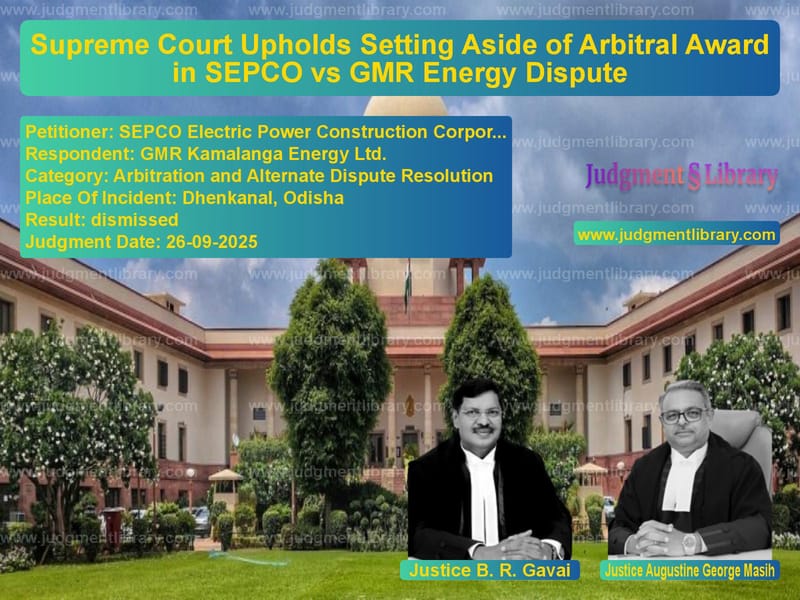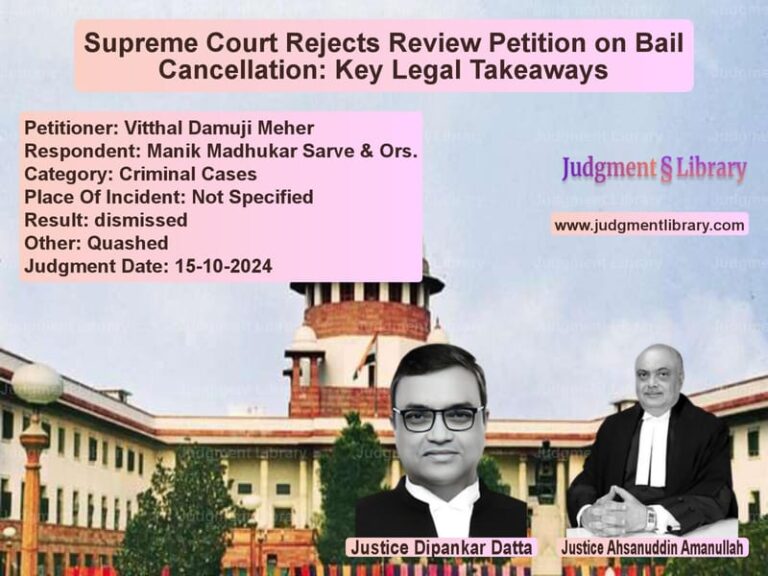Supreme Court Upholds Setting Aside of Arbitral Award in SEPCO vs GMR Energy Dispute
In a landmark judgment that reinforces the boundaries of arbitral authority, the Supreme Court of India has dismissed SEPCO Electric Power Construction Corporation’s appeal, upholding the setting aside of a nearly ₹995 crore arbitral award. The case, which involved complex contractual disputes between SEPCO and GMR Kamalanga Energy Limited, centered around the construction of three 350 Mega Watt coal-fired thermal power plants in Odisha’s Dhenkanal district.
The legal battle originated from multiple Engineering, Procurement, and Construction (EPC) agreements dating back to 2008, which were subsequently amended several times. Disputes arose between the parties regarding delays, contractual obligations, defects, and financial entitlements under these agreements, leading SEPCO to issue a Notice of Arbitration in June 2015.
The Arbitral Tribunal, in its award dated September 7, 2020, had determined that GMRKE Limited was liable to pay approximately ₹995 crores to SEPCO. However, this award faced multiple legal challenges, ultimately reaching the Supreme Court after both the Single Judge and Division Bench of the Orissa High Court took contrasting positions on its validity.
The Supreme Court’s judgment, delivered by a bench comprising Chief Justice B.R. Gavai and Justice Augustine George Masih, provides crucial clarity on several fundamental principles of arbitration law, particularly concerning the limited scope of judicial intervention in arbitral awards and the paramount importance of contractual terms in commercial disputes.
The court emphasized the narrow scope of interference under Sections 34 and 37 of the Arbitration and Conciliation Act, 1996, stating that “the jurisdiction conferred on courts under Section 34 of the Arbitration Act is fairly narrow, when it comes to the scope of an appeal under Section 37 of the Arbitration Act, the jurisdiction of an appellate court in examining an order, setting aside or refusing to set aside an award, is all the more circumscribed.”
One of the central issues in the case concerned the Arbitral Tribunal’s finding that the requirement for contractual notices had been waived through emails exchanged in March 2012. The Supreme Court found this determination problematic, noting that the Arbitral Tribunal had essentially rewritten the contract terms despite explicit “No Waiver” and “No Oral Modification” clauses in the agreement.
The court observed that “the Arbitral Tribunal, itself being a creature of the EPC Agreements, could not have travelled beyond its mandate to rewrite the constitution of its own existence through observing the condition of notice having been waived.” This finding reinforced the principle that arbitrators must operate within the boundaries set by the contractual agreement between the parties.
Another significant aspect of the judgment addressed the discriminatory treatment meted out by the Arbitral Tribunal. While SEPCO’s claims were granted despite its admitted failure to issue contractual notices, GMRKE Limited’s counterclaims were rejected on the ground that it failed to serve equivalent notices. The Supreme Court found this unequal treatment violative of Section 18 of the Arbitration Act, which mandates equal treatment of parties.
The court strongly stated that “the Division Bench did not, and rightly so, turn a blind eye to such a glaring example of unequal treatment.” This aspect of the judgment underscores the fundamental principle that natural justice requires consistent application of standards to all parties in dispute resolution.
The Supreme Court also addressed the Arbitral Tribunal’s finding regarding the Performance Guarantee Test, where it had declared the test successfully completed despite having recorded the failure of the prerequisite Unit Characteristic Test. The court found that this amounted to modifying the express terms of the agreements, which was contrary to the public policy of India.
In its comprehensive analysis, the Supreme Court referenced numerous precedents, including Associate Builders v. Delhi Development Authority and Ssangyong Engineering and Construction Company Limited v. National Highways Authority of India, to reinforce the limited grounds for interfering with arbitral awards. However, the court clarified that when an award violates fundamental policy of Indian law or principles of natural justice, judicial intervention becomes necessary.
The court elaborated on the principle of party autonomy in arbitration, noting that “the parties to a dispute are always at liberty to choose the substantive law, procedural law, and the law of the arbitration agreement so applicable. Party autonomy is widely acknowledged as the foundation of the contemporary arbitration.” However, this autonomy is not absolute and must operate within the framework of mandatory provisions of the law.
In addressing SEPCO’s contention that the scope of interference under Section 37 is narrower than under Section 34, the Supreme Court acknowledged this principle but found that in this case, the violations were so fundamental that intervention was warranted. The court stated that “an attack on the fundamental policy of Indian law allows for reappreciation and thereby, the Impugned Judgment cannot be faulted with on the ground of having exceeded its jurisdiction under Section 37 of the 1996 Act.”
The judgment also provides important guidance on the distinction between the seat of arbitration and the venue of arbitration proceedings, clarifying that when the seat of arbitration is India, Indian courts have exclusive jurisdiction to determine disputes pertaining to the arbitration process.
In its concluding remarks, the Supreme Court summarized its findings by stating that “non-interference and non-setting aside of the award would have hampered upon the fundamental policy of Indian law as well as the public policy of India.” The court found that the Arbitral Award could not be severed due to the fundamental nature of the violations and therefore upheld the setting aside of the entire award.
This judgment serves as a significant precedent in Indian arbitration law, reinforcing the principle that while courts generally maintain a hands-off approach to arbitral awards, they will intervene when awards violate fundamental principles of justice, exhibit patent illegality, or rewrite contractual terms contrary to the parties’ explicit agreement. The decision emphasizes that arbitration, while being an alternative dispute resolution mechanism, must still operate within the framework of established legal principles and contractual boundaries.
The Supreme Court’s dismissal of SEPCO’s appeal marks the culmination of a lengthy legal battle that began with the arbitration notice in 2015. The judgment provides clarity on several contentious issues in arbitration law and reinforces the importance of contractual integrity and equal treatment of parties in commercial dispute resolution.
Petitioner Name: SEPCO Electric Power Construction Corporation.Respondent Name: GMR Kamalanga Energy Ltd..Judgment By: Justice B. R. Gavai, Justice Augustine George Masih.Place Of Incident: Dhenkanal, Odisha.Judgment Date: 26-09-2025.Result: dismissed.
Don’t miss out on the full details! Download the complete judgment in PDF format below and gain valuable insights instantly!
Download Judgment: sepco-electric-power-vs-gmr-kamalanga-energy-supreme-court-of-india-judgment-dated-26-09-2025.pdf
Directly Download Judgment: Directly download this Judgment
See all petitions in Arbitration Awards
See all petitions in Commercial Arbitration
See all petitions in Enforcement of Awards
See all petitions in Contract Disputes
See all petitions in Dispute Resolution Mechanisms
See all petitions in Judgment by B R Gavai
See all petitions in Judgment by Augustine George Masih
See all petitions in dismissed
See all petitions in supreme court of India judgments September 2025
See all petitions in 2025 judgments
See all posts in Arbitration and Alternate Dispute Resolution Category
See all allowed petitions in Arbitration and Alternate Dispute Resolution Category
See all Dismissed petitions in Arbitration and Alternate Dispute Resolution Category
See all partially allowed petitions in Arbitration and Alternate Dispute Resolution Category







